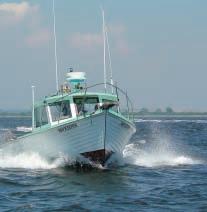
4 minute read
Farr on Film: In the Navy
In the Navy Part 1
By John Farr
This continuing series on films relating to our most precious resource, the earth’s water, has to include the rich sub-genre of navy movies. Throughout history, sea power has shaped the power of nations in wartime and in peace. Over the years, a slew of outstanding navythemed films have furnished us with a variety of salty celluloid adventures worth catching. My first installment follows: Mutiny On The Bounty (1935): In late 18th century Great Britain, sadistic Captain Bligh (Charles Laughton) commands the HMS Bounty on a long voyage to Tahiti. When Bligh’s cruelty to his crew goes beyond reasonable limits, second-in-command Fletcher Christian (Gable) faces the fateful decision of whether to seize control of the ship. MGM’s adaptation of the famous Nordhoff/Hall book is given top shelf treatment here, with a sneering Laughton the definitive Bligh, and the studio’s biggest star, Gable, playing Christian with gusto (and, notably, without either a British accent or his trademark mustache). But never mind — this is still grand, sweeping entertainment, suitable for the whole family. And Laughton is truly brilliant. They Were Expendable (1945): This is the story of the PT boats in the tough, early days of World War II in the Pacific. Skipper John Brickley (Montgomery) and his right hand man, Rusty Ryan (Wayne), have difficulty convincing the navy brass of the PTs’ value to the war effort. They must work to prove it, and do. Eventually, these nimble craft will play a vital role in turning the tide in the Pacific, allowing General MacArthur to fulfill his famous promise to return there in glory. Director John Ford delivers a powerful human tale of faith and hope sustained during the darkest days of the war for the Allies. Montgomery (father of Elizabeth from TV’s “Bewitched,” and an actual decorated PT boat captain) is superb as the embattled but stoic Brickley, and the Duke is also in fine form as Ryan. Donna Reed makes for a bewitching love interest as the nurse who falls for Rusty. One of Ford’s more under-exposed gems. The Caine Mutiny (1954): Based on Herman Wouk’s sprawling novel, this film centers on the neurotic, inflexible Captain Queeg (Humphrey Bogart), a career naval officer whose men relieve him of command when Queeg supposedly falters in guiding his ship through a perilous typhoon. Once on terra firma, Queeg ensures the men get court-martialed for mutiny, and as the trial progresses, the sad truth is gradually revealed. But is justice really done? Edward Dmytryk’s stunning production remains one of our best war films and (incidentally) courtroom dramas. A trio of outstanding performances distinguish it: an Oscarnominated Bogart in one of his best turns as the embattled Queeg; Jose Ferrer, who almost steals the picture as whip-smart defense lawyer Barney Greenwald; and finally, Fred MacMurray, poignant in the unsympathetic part of a cowardly Lieutenant. All hands on deck for this one. Mister Roberts (1955): Adapted from Joshua Logan’s Broadway hit, this service drama tells of Lt. Doug Roberts (Henry Fonda), an officer on a WWII cargo ship, desperate to see action, who instead has to cope with irascible, by-the-book Captain Morton (Cagney). Roberts is frustrated by life aboard the SS “Reluctant,” but thankfully Ensign Pulver (Jack Lemmon) — “in charge of laundry and morale” — is on board to provide him and the crew with much-needed laughs and sympathy. Returning to the big screen after an eight-year absence, Fonda successfully recreated his indelible stage role in “Mister Roberts” under the initial direction of John Ford, replaced by Mervyn LeRoy when Ford and Fonda literally came to blows just weeks into shooting! Young Lemmon must have been humbled by the cast line-up for this film: Fonda, Cagney, and the legendary William Powell (as a philosophical ship doctor) all on the same boat! Yet his manic energy was ideal for Pulver, winning Lemmon that year’s Best Supporting Actor Oscar. Also notable as Powell’s last screen appearance. Das Boot (1981): Chronicling one German U-Boat’s perilous search-and-destroy mission as the tide has turned toward the Allied cause in the Second War, Wolfgang Peterson’s brilliant “Das Boot” has a claustrophobic immediacy. We observe the tense faces of young, inexperienced men doing their duty, most of whom realize that even if they cheat death, Germany’s defeat is inevitable. Originally a 210-minute German mini-series edited down to feature length, “Boot” is haunting and works as an anti-war piece precisely because it is seen from the losing side. German actor Jurgen Prochnow turns in an intense portrayal of the boat’s desperate captain. The film’s other star—director Peterson’s camera—roves through the sub fluidly, never allowing the viewer a breath of escape or boredom.
Check in next time for my second batch of high-ranking Navy films on DVD, and till then, smooth sailing. W








